CSF hosted the inaugural edition of the CSF Education Conclave on Tuesday, 11th April 2023, at the India Habitat Centre. The conclave aimed at mainstreaming issues and sharing best practices around the progress of foundational literacy and numeracy as outlined under the government of India’s flagship NIPUN Bharat mission. With a series of panel discussions and curated conversations with speakers and experts from the education sector in India and globally, more than 230 people attended the event, including partners from across India’s education ecosystem, young changemakers, academics, students, and education consultants.
The event kicked off with a welcome address by Shaveta Sharma-Kukreja (CEO-MD, Central Square Foundation). Stating that “What’s delayed is done better,” Shaveta welcomed the attendees and set the context for the conclave. Ashish Dhawan (Founder-CEO, The Convergence Foundation) delivered the keynote address where he acknowledged the work of the many non-profits that have been working on FLN since even before the release of NEP 2020 and the launch of NIPUN. He remarked that while there is excitement around FLN, the mission has only just started, and that it is a wonderful learning opportunity and a once-in-a-lifetime chance to be a part of this change.
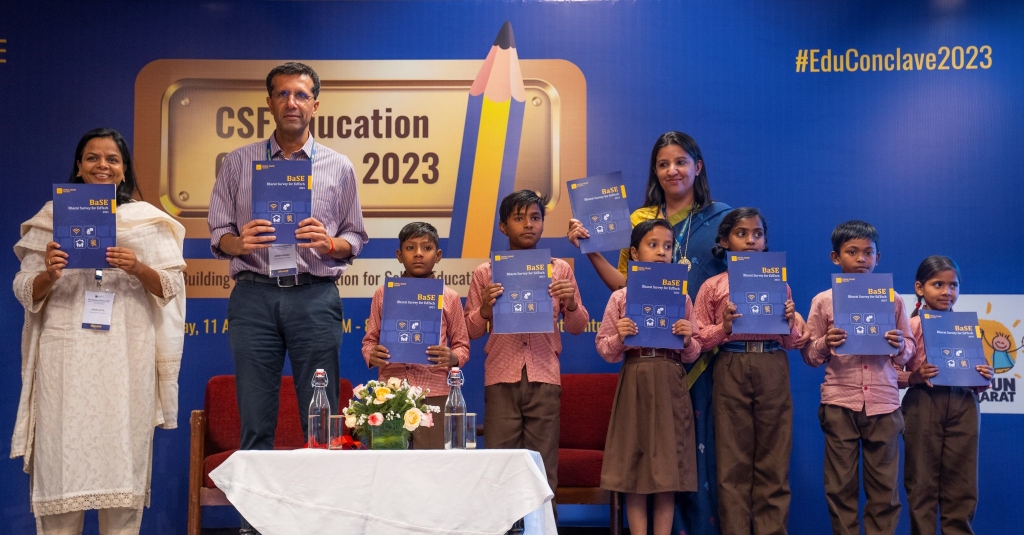
Strengthening the System
The discussions in the first half centered around exploring ways to improve foundational literacy and numeracy in India at the state government level. In an informative panel discussion titled “Moving the Needle of FLN, from Commitment to Change” moderated by Amitav Virmani (Founder and CEO, The Education Alliance), government representatives from Haryana, Madhya Pradesh, and Telangana were invited to discuss their experiences of how states are engaging with the FLN mission. Deeming low levels of FLN as an emergency, Karuna Vakati IAS (Secretary, Dept. of School Education, Govt. of Telangana) highlighted Telangana’s Tholimettu’s prioritization of process rather than outcomes, where the focus is to change “what transacts between a teacher and a child in a fundamental manner.” Anshaj Singh IAS (State Project Director, Samagra Shiksha, Dept. of Education, Govt. of Haryana) underscored the role of effective monitoring in the success of any mission by illustrating, through personal anecdotes, the impact of Haryana’s systemized monitoring system on student attendance and achievement of competencies by students. Referring to the importance of consonance between Teaching Learning Material and Teacher Professional Development, Lokesh Jangid IAS (Additional MD, Samagra Shiksha, Dept. of School Education, Govt. of Madhya Pradesh) pointed out that Madhya Pradesh has not only developed student workbooks, worksheets, and teacher guides but has also built teacher capacity to use the TLM through a training program that minimizes cascade loss. Having heard the states’ experiences, Sourav Banerjee (Country Director, Room to Read India) rightly remarked that while NEP well articulates the why of FLN, and NIPUN talks about the whats of FLN, it is the states that each have to develop the how of FLN based on their context if we are to improve learning outcomes of our children.
In the audience was also a group of the end beneficiaries of our FLN work – our children, who were invited on stage by Neelesh Misra (Storyteller, RJ, Journalist, and Author) for a refreshing storytelling session. Neelesh Misra demonstrated the magic created when learning takes place in an engaging and playful manner.
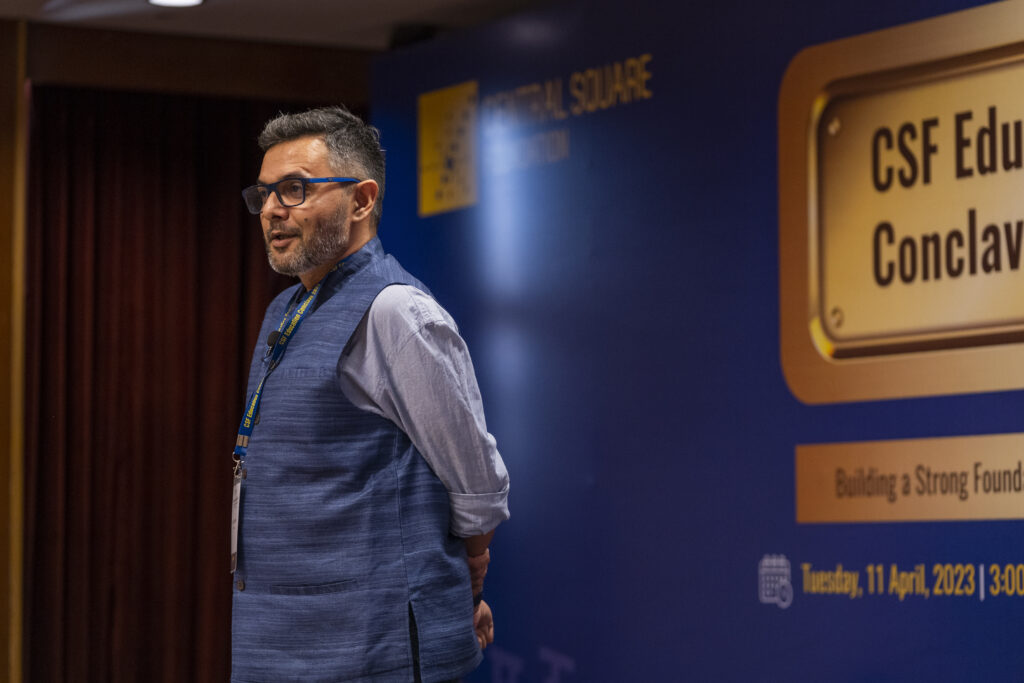
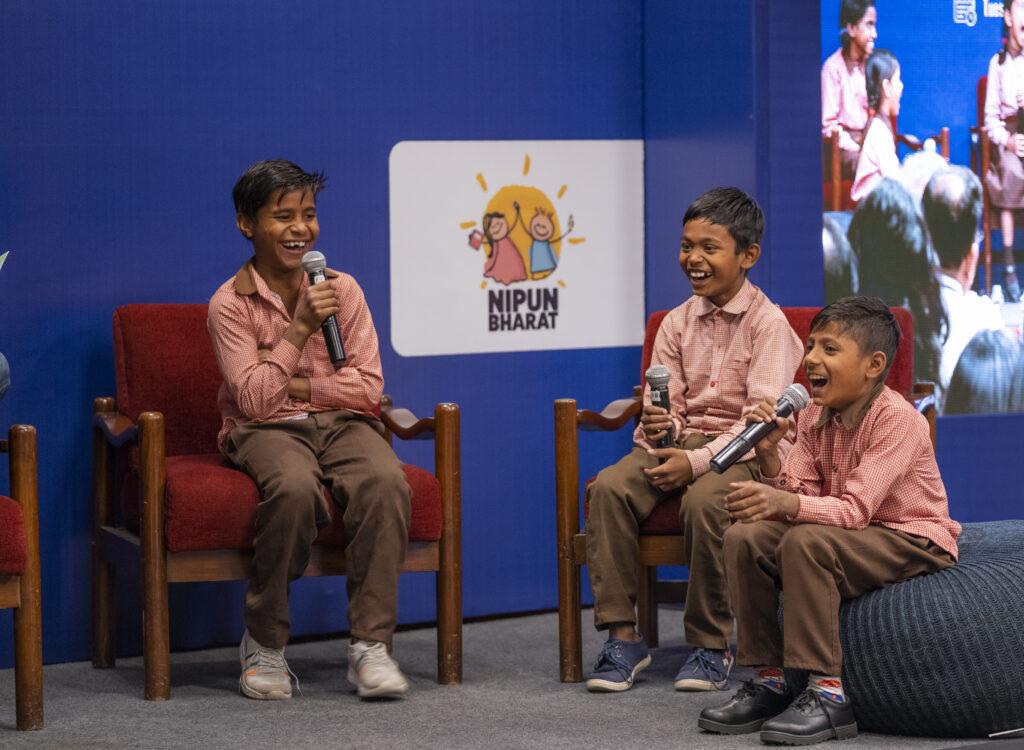
The next session was a Q & A with Dr. Joseph Emmanuel (Director – Academics, CBSE) moderated by Ms. Jayshree Oza (Senior Advisor, CSF) on competency-based assessments for improving student learning and school quality, specifically CBSE’s Structured Assessment for Analyzing Learning (SAFAL). Dr. Joseph reiterated the significance of digital assessments, playful earning and joyful assessments.

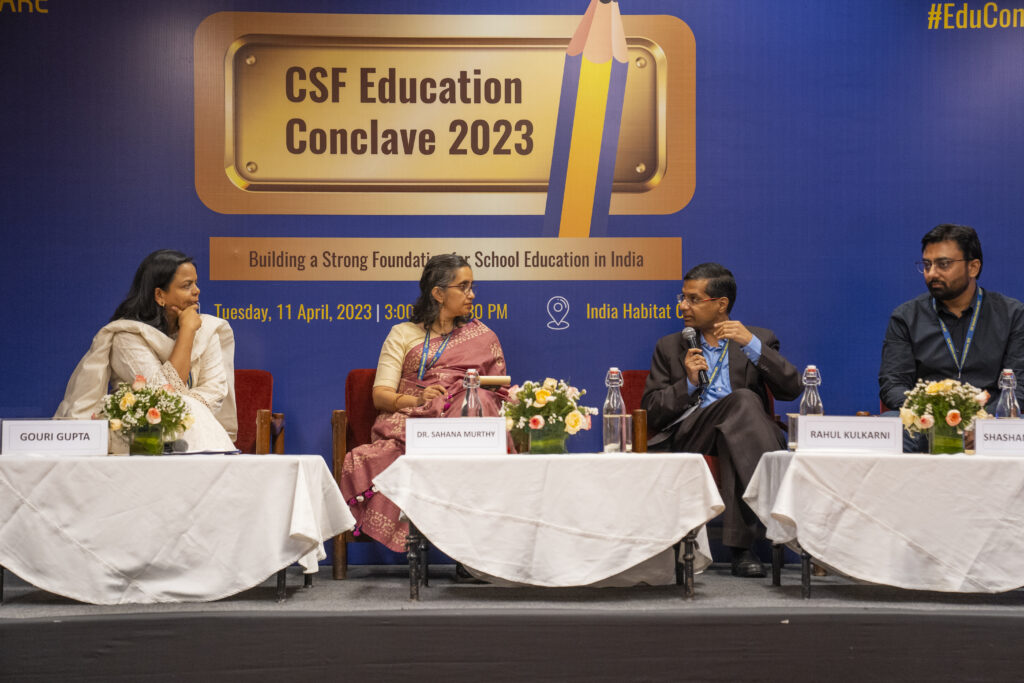
Levers for Improving Foundational Learning
The second half of the conclave focused on Edtech and Early Childhood Care and Education as critical enablers of FLN. Ashish Dhawan, Shaveta Sharma-Kukreja, and Gouri Gupta (Project Director – EdTech, Central Square Foundation) were invited on stage to formally launch the Bharat Survey for EdTech (BaSE), India’s first household survey on EdTech awareness and usage. The report launch, followed by a brief presentation of key findings from the report, set the context for discussion on the imperatives of EdTech in India and the way forward. Moderated by Gouri Gupta, sector experts were invited to weigh in on the EdTech landscape in India, what EdTech means for school education, and how stakeholders can leverage it meaningfully to improve learning outcomes. Terming EdTech as a Jhanki to the outside world, Rahul Kulkarni (Co-Founder and Partner, DoNew and Chief Technologist, Samagra) laid out how the Sarkaar (the government), Samaaj (the community), and Bazaar (the marketplace) all come together to leverage the potential of EdTech. Shashank Pandey (Co-Founder and President, ConveGenius) focused on the inclusivity aspect of EdTech and shared his key insight from his work creating learning bots on Whatsapp – “Fancy EdTech does not work”. He also outlined the importance of understanding the drivers of demand for different users of EdTech and designing products that respond to these varied demands. Sahana Murthy (Professor – Ed Tech, IIT Bombay) raised a related concern, i.e., obtaining clarity on what we are using EdTech for. She emphasized that in addition to this clarity, defining and meeting quality standards and paying close attention to the implementation of EdTech is critical to extract the potential EdTech holds.
The context for the session on Early Childhood Care and Education was set by Aditi Nangia, who presented an overview of the ECCE landscape in India, its opportunities, and challenges. After the presentation, two senior experts were invited to react to the presentation based on their expertise and experience. Amrita Sengupta (Education Specialist, Rajasthan, UNICEF) remarked that while there has been some work around curriculum and workbooks for ECCE in at least 15 states, there are constraints such as inadequate capacity, reduction in dedicated budgets, and lack of a monitoring system that need to be acknowledged and corrected if we want to strengthen the results of FLN. Addressing the current capacity constraint, Dr. Venita Kaul (Professor Emerita (Education), Ambedkar University, Delhi) pointed out the benefits and proven success of toy-based learning and how it can be used in the Indian context to solve capacity constraints.
A conclave on education would have been incomplete without hearing the stories of key stakeholders in the field. To that end, Dr. Dhir Jhingran (Founder and Executive Director, Language and Learning Foundation) set the context for the session by presenting an overview of the design and implementation of the NIPUN mission in Uttar Pradesh, after which he invited the panelists to the stage. Abdur Rahman, a Numeracy teacher of a government primary school in the Sewapuri Block in Uttar Pradesh, praised the TLM sent to his school, as it has not only ensured a print-rich environment for the children but has also reduced the burden on the teachers by providing detailed lesson plans. Pooja Kannoujia, a Literacy teacher of a government primary school in the Sewapuri Block in Uttar Pradesh, also acknowledged the contribution of teaching guides and workbooks in reducing the learning loss to children post the pandemic.
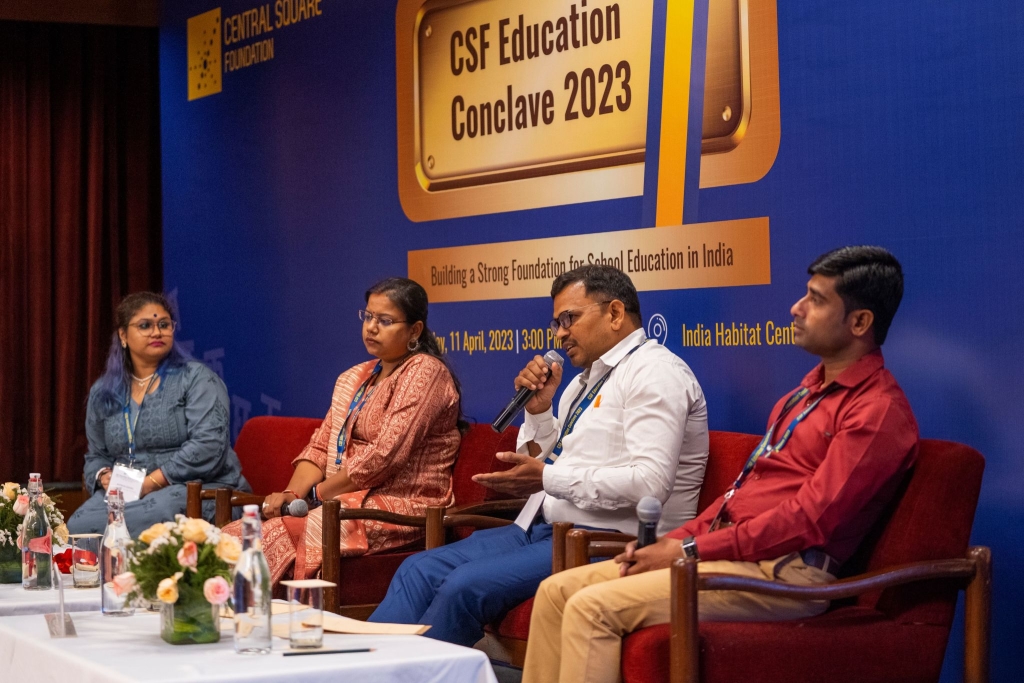
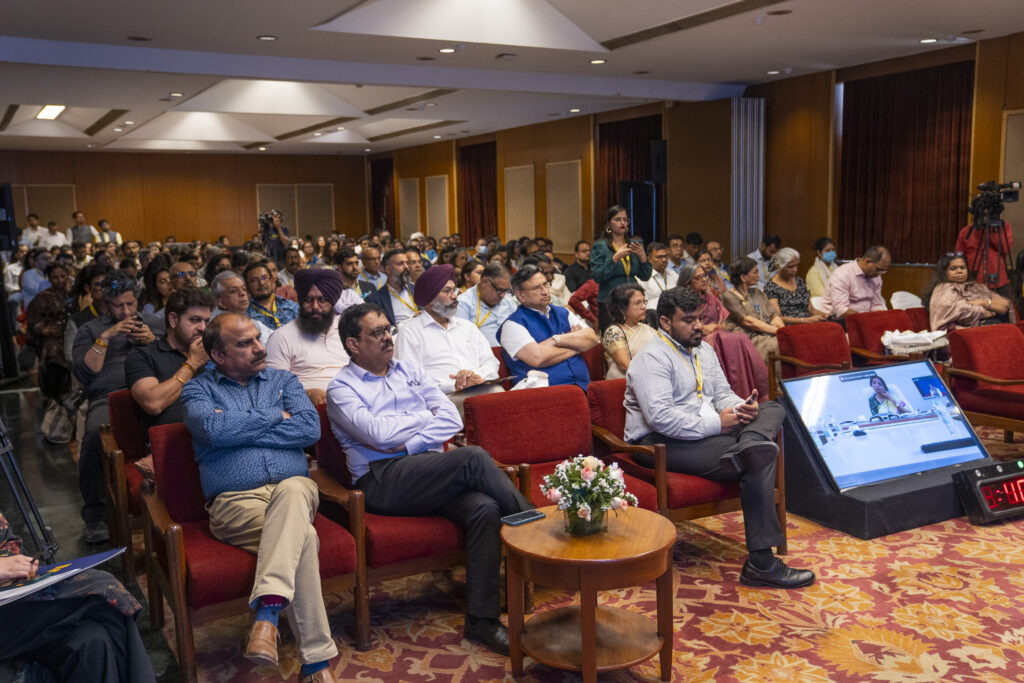
Both Abdur and Pooja appreciate the supporting role ARPs and DIET mentors play in ensuring that what the teachers learn during training is implemented in the classrooms. Among the panelists was Dr. Dinesh Chand, an Academic Resource Person (ARP) for the Sewapuri Block in Uttar Pradesh, who illustrated how ARPs carry out school visits, collect data for monitoring, and support teachers.
It was followed by a virtual talk with Dr. Karthik Muralidharan (Professor in Economics, University of California, San Diego) and Dr. Luis Crouch (Emeritus Senior Economist, RTI International) who joined online to frame the evidence around FLN in a global context. Dr. Luis Crouch laid emphasis on structured pedagogy as the key to learning, the negative effects of using learning data for punitive action, and the importance of constantly experimenting, iterating, and adapting interventions. Dr. Karthik Muralidharan seconded the importance of structured pedagogy, busting myths about its perception of removing autonomy from the teachers. Drawing an analogy between medical science and structured pedagogy, he illustrated how structured pedagogy is about bringing evidence into the hands of teachers and not removing autonomy. He stressed the need for independent verifiable measures of learning outcomes if we want to convert the movement of national focus on FLN to action and concluded by outlining the kind of institutions we need – ones that provide autonomy on the process and accountability on outcomes.
The conclave concluded with a vote of thanks from Shaveta Sharma-Kukreja who expressed that the entire sector was energized, confident, and hopeful after the NEP 2020, which not only focuses on FLN but also provides the opportunity for Balvatika – “the step 0 of NIPUN.” She thanked all the partners and champions of change for being present at the conclave.
